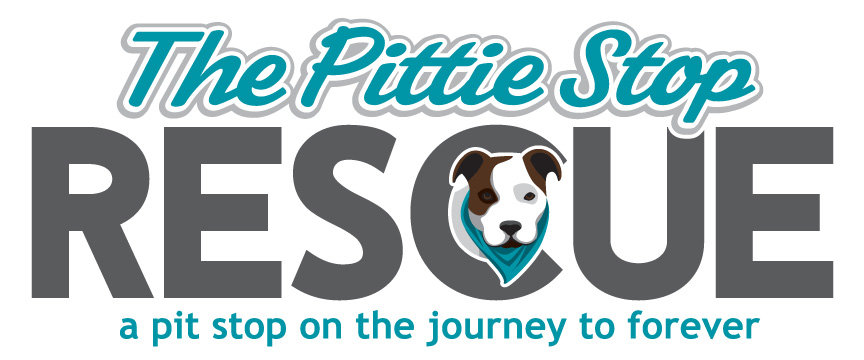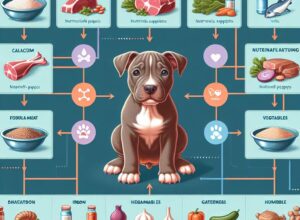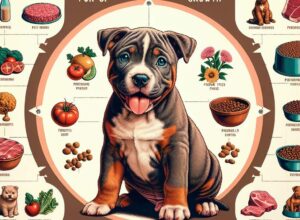
Nourishing Your Pitbull Puppy Back to Health: Rickets Recovery
Watching your playful pitbull puppy grow into a strong, healthy dog is one of the joys of pet ownership. But when rickets threatens to derail that growth, it’s crucial to act fast. Rickets, a bone disease caused by a lack of essential nutrients, can lead to long-term health issues for your pup. But don’t worry, recovery is within reach with the right diet and nutrition plan.
Key Takeaways: Article-at-a-Glance
- Understand rickets in pitbull puppies and why a balanced diet is key to prevention and treatment.
- Discover the importance of calcium and phosphorus in your puppy’s diet and how to maintain the right ratio.
- Learn about the critical role of Vitamin D in bone health and how to ensure your pup gets enough.
- Identify the signs of rickets and the steps to take if you suspect your puppy is affected.
- Get tips on adjusting your pitbull puppy’s diet and the best foods for supporting their recovery from rickets.
Rickets and Your Pittie Pup
Rickets may sound scary, but it’s a condition that can be managed and even reversed with the proper care. It’s all about giving your puppy the nutrients they need to build strong bones. By ensuring your pitbull gets the right balance of vitamins and minerals, you’re setting them up for a healthy, active life, free from the limitations of rickets.
Finding the Right Balance: Calcium and Phosphorus
Your pitbull puppy’s diet needs to have the right mix of calcium and phosphorus. These minerals work together to form strong bones and teeth. Too much or too little of either can cause problems. The ideal calcium to phosphorus ratio in your puppy’s diet should be between 1:1 and 2:1. This balance supports bone growth and helps prevent rickets.
Essential Supplements: The Role of Vitamin D
Vitamin D isn’t just for humans; it’s vital for your pitbull puppy too. It helps their body absorb calcium and phosphorus from their food. Without enough Vitamin D, your pup could end up with weak, poorly formed bones. Make sure your puppy’s diet includes plenty of Vitamin D-rich foods or consider a supplement if advised by your vet.
Uncovering Rickets: A Pitbull Puppy Health Menace
Rickets is a condition that can sneak up on unsuspecting pet parents. It’s caused by a deficiency in essential nutrients, leading to soft and weak bones. But knowledge is power. By learning about rickets and its causes, you can take proactive steps to protect your pitbull puppy from this preventable condition.
What is Rickets?
Rickets is a bone disorder that affects young dogs, particularly during their rapid growth phase. It’s characterized by the softening and weakening of bones, resulting from a deficiency in vital nutrients like calcium, phosphorus, and Vitamin D. These nutrients are crucial for developing strong and healthy bones, so a lack can lead to skeletal deformities and an increased risk of fractures.
How Do Pitbull Puppies Get Rickets?
Pitbull puppies can develop rickets when their diets don’t provide enough of the nutrients they need for bone health. This can happen if they’re fed a homemade diet that’s not well-balanced, or if they’re on a low-quality commercial food that skimps on essential ingredients. Lack of proper sunlight exposure, which helps their bodies produce Vitamin D, can also contribute to the development of rickets.
First Steps in Rickets Treatment
If you suspect your pitbull puppy has rickets, the first step is to consult your veterinarian. They can diagnose the condition through physical exams and X-rays. Treatment typically involves correcting the nutritional deficiencies that caused the rickets in the first place. This will include adjusting your puppy’s diet and possibly adding supplements.
Puppy Diet Overhaul
Revamping your pitbull puppy’s diet is critical in treating rickets. You’ll need to ensure they’re getting the right amounts of calcium, phosphorus, and Vitamin D. High-quality commercial puppy foods are formulated to support healthy bone development, but it’s always good to check the label for these nutrients. In some cases, a homemade diet, designed by a veterinary nutritionist, might be recommended to meet your puppy’s specific needs.
Vet-Recommended Supplements
Your vet might also suggest supplements to help correct any deficiencies. These can include calcium, phosphorus, and Vitamin D supplements. It’s important to follow your vet’s guidance on the type and amount of supplement to give, as too much can be just as harmful as too little.
The Pitbull Puppy Diet
A well-balanced diet is the cornerstone of your pitbull puppy’s health. It should be rich in high-quality protein sources for muscle development, have the right balance of fats for energy, and include carbohydrates for digestive health. But for bone development, the focus is on minerals and vitamins, particularly calcium, phosphorus, and Vitamin D, which should be present in the correct ratios for optimal absorption and bone health.
Building Strong Bones: Foods to Include
To fortify your pitbull puppy’s bones, certain foods should be staples in their diet. Lean meats like chicken, turkey, and beef are excellent protein sources that aid in bone development. Dairy products, such as yogurt and cottage cheese, provide calcium, which is essential for bone strength. Fish, especially those rich in omega-3 fatty acids like salmon, are not only good for the joints but also help with the absorption of vitamins and minerals.
- Lean meats (chicken, turkey, beef)
- Dairy products (yogurt, cottage cheese)
- Fish (salmon, sardines)
- Eggs (cooked)
- Leafy greens (kale, spinach)
- Calcium-fortified foods
- Whole grains (for puppies that can tolerate them)
Foods to Avoid: Steering Clear of Deficiencies
Just as there are foods that help your pitbull puppy’s bones grow strong, there are also foods that can hinder their development. Avoid feeding your puppy foods that are high in oxalates, like spinach and rhubarb, which can prevent calcium absorption. Excessive feeding of liver can lead to vitamin A toxicity, which negatively impacts bone health. Also, stay away from foods that are high in phosphorus and low in calcium, as this can disrupt the delicate mineral balance necessary for bone strength.
- Spinach and rhubarb (high in oxalates)
- Liver (in large quantities)
- Foods with high phosphorus and low calcium ratio
- Chocolate, onions, and garlic (toxic to dogs)
- Processed human foods high in salt and sugar
Breaking Down The Nutrition: Detailed Food Guide
Creating a balanced diet for your pitbull puppy is like crafting a masterpiece. It requires a blend of the right nutrients in the right amounts. Here’s a detailed guide to the components of a nutritious diet that supports bone health and overall well-being.
Protein Power: Building Muscle and Bone
Protein is the building block of muscle and bone. High-quality protein sources like chicken, turkey, and fish support your puppy’s growth and help repair body tissues. When choosing protein for your pitbull puppy, always opt for lean cuts and cook them plainly without any harmful seasonings or oils.
- Chicken (breast or ground)
- Turkey (lean cuts)
- Fish (salmon, mackerel)
- Eggs (fully cooked)
- Pork (lean cuts, cooked plainly)
Magnificent Minerals: Calcium, Phosphorus, and Vitamin D
The trio of calcium, phosphorus, and Vitamin D is non-negotiable for your pitbull puppy’s diet. Calcium and phosphorus are the primary minerals in bones, while Vitamin D facilitates their absorption. Dairy products and certain vegetables can provide calcium, while meats and eggs will supply phosphorus. Vitamin D can be found in fish and egg yolks, but sunlight exposure is also a natural and effective way to ensure your puppy gets enough Vitamin D.
- Dairy products (low-fat yogurt, cheese)
- Vegetables (collard greens, turnip greens)
- Meats (chicken, turkey, beef)
- Eggs (especially the yolks)
- Fatty fish (for natural Vitamin D)
Fabulous Fats: Omega-3s and Healthy Oils
Fats are essential for energy, but the type of fat is what’s most important. Omega-3 fatty acids, found in fish oil and flaxseed, support joint health and reduce inflammation. Healthy oils, like olive oil and coconut oil, can be added in small amounts to your puppy’s food for added fat content that’s beneficial, not detrimental, to their health.
- Fish oil (rich in omega-3s)
- Flaxseed (ground or oil)
- Olive oil (a drizzle on their food)
- Coconut oil (in moderation)
- Chia seeds (a source of good fats)
Supplementing Your Pitbull Puppy’s Diet
Even with the best diet, sometimes your pitbull puppy might need a little extra boost. Supplements can play a crucial role in ensuring your pup gets all the nutrients they need, especially when recovering from rickets. But it’s not about just giving any supplement; it’s about giving the right ones in the right amounts.
Choosing the Right Vitamin D Supplement
When sunlight and diet alone aren’t enough, a Vitamin D supplement can help your pitbull puppy absorb calcium effectively. Look for supplements specifically designed for dogs, as human vitamins may not be appropriate and could cause harm. Always consult with your vet before starting any new supplement to determine the correct dosage for your puppy’s size and specific needs.
Calcium Supplements: Are They Necessary?
Calcium supplements can be beneficial, especially for puppies diagnosed with rickets. However, more isn’t always better. An excess of calcium can lead to other health issues, including skeletal problems as your puppy grows. Your vet can help you decide if a calcium supplement is necessary and, if so, prescribe the right amount that complements your pup’s diet without going overboard.
Monitoring Your Pitbull Puppy’s Progress
As your pitbull puppy grows, keeping a close eye on their development is essential. Regular check-ups with the vet, along with your observations at home, will help you track their progress and make sure they’re on the right path to recovery from rickets and towards a healthy adulthood.
Tracking Growth and Development
Keep an eye on your puppy’s size and weight, but also pay attention to their behavior and activity levels. Are they playing and running with ease, or do they seem hesitant and uncomfortable? Regular vet visits should include discussions about your puppy’s growth chart and any concerns you may have about their development.
Adjusting Diet as Your Puppy Grows
As your pitbull puppy grows, their nutritional needs will change. They’ll need more of some things and less of others. It’s a balancing act that requires adjustments to their diet over time. Regular check-ins with your vet will help you tweak your pup’s diet as needed, ensuring they always have the right fuel for healthy growth.
FAQs: Answers to Your Rickets Concerns
What Are the Signs My Pitbull Puppy Might Have Rickets?
Keep an eye out for warning signs like a noticeable weakness in your puppy’s legs, bowed legs, or difficulty walking. Your pup may also show tenderness or pain in their bones, which can make them reluctant to play or move around. If you notice any unusual swelling around the joints or a change in the shape of their bones, it’s time to consult your vet.
- Weakness or instability in the legs
- Bowed legs or difficulty walking
- Bone pain and tenderness
- Swelling around joints
- Changes in bone shape
How Long Does It Take to Treat Rickets in Puppies?
The recovery time from rickets can vary depending on how early the condition is caught and how quickly treatment begins. With proper diet adjustments and supplements, you may start to see improvements in your puppy’s symptoms within a few weeks. However, full recovery and bone healing can take several months. Consistent follow-up with your vet is crucial to monitor progress.
Can Rickets Be Completely Cured in Pitbull Puppies?
Yes, with early detection and proper treatment, rickets can be completely cured in pitbull puppies. It’s vital to address the nutritional deficiencies that led to the condition and to maintain a balanced diet throughout your puppy’s growth period. Full recovery is possible, and most puppies go on to lead healthy, active lives.
What are the Long-term Effects of Rickets in Dogs?
If left untreated, rickets can lead to permanent bone deformities and growth issues. However, with proper treatment, these long-term effects can be avoided. It’s essential to correct the nutritional deficiencies as soon as possible to prevent any lasting damage to your puppy’s skeletal system.
How Can I Prevent Rickets in My Pitbull Puppy?
Preventing rickets is all about ensuring your pitbull puppy gets a balanced diet that meets all their nutritional needs. Choose high-quality puppy food that’s appropriate for their age and size, and make sure they get enough sunlight for natural Vitamin D synthesis. If you’re considering a homemade diet, consult with a veterinary nutritionist to ensure it’s fully balanced.
Remember, a healthy pitbull puppy is a happy one. Keep their diet balanced, their bones strong, and their tail wagging!
In conclusion, rickets in pitbull puppies is a serious but treatable condition. By recognizing the signs early, consulting with your vet, and providing a nutritious diet rich in calcium, phosphorus, and Vitamin D, you can help your puppy overcome this challenge. Regular check-ups and a watchful eye on their development will ensure your pitbull puppy grows up to be a strong and healthy dog. Together, we can keep those tails wagging and those paws running strong!



